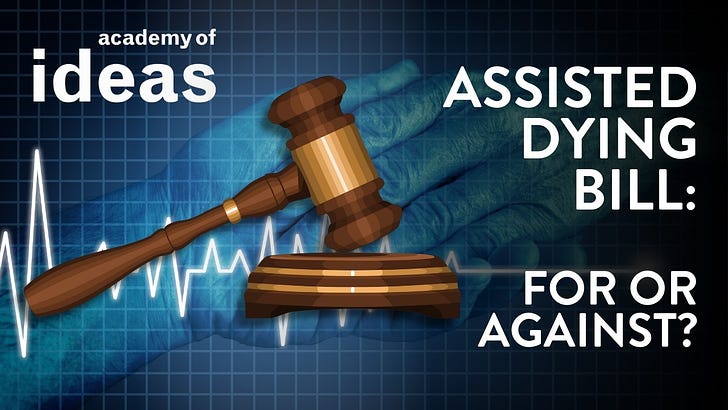Assisted dying: what's at stake? Hear from both sides of the debate
Four excellent speakers made the case for and against Kim Leadbeater's Terminally Ill Adults (End of Life) Bill, reflecting the serious moral dilemmas at the heart of the debate.
Over recent weeks, there has been much media attention on The Terminally Ill Adults (End of Life) Bill, put forward by Labour backbencher Kim Leadbeater, that will be debated and voted on in parliament on Friday. Many people are genuinely conflicted; several people I know have changed their minds. In the AoI spirit of adding depth to public conversations, we thought you might find it useful to watch recent debates we have organised.
We discussed the issue at this year's Battle of Ideas festival in London (see the speeches below). On Tuesday, we invited four excellent speakers, covering both sides of this morally difficult question of life and death, to introduce a public debate online. The result was a thought-provoking and passionate discussion that was a privilege to chair.
Opening the debate was James Esses, a former criminal barrister and founder of Thoughtful Therapists, and a supporter of legalisation. James emphasises that what we have now is dying without dignity for many people. While concerns about safeguards are important, we should not let those distract us from the suffering that is going on among the terminally ill.
Sonia Sodha, an Observer/Guardian columnist and leader writer, spoke next. Sonia originally supported legalisation, but has changed her mind over the years. She emphasised the issue of coercion. Despite the Bill’s attempts to safeguard against this, her experience of writing about the issue over many years, particularly in relation to domestic abuse, makes her very sceptical that the Bill can prevent it.
Rabbi Dr Jonathan Romain MBE, chair of Dignity in Dying, made the point that this is not a simple question of religious vs non-religious people. In fact, when polled, a majority of practising religious people from various faiths supported assisted dying. The question of hastening someone’s death when it has become inevitable is very different from suicide when someone could have years to live.
Professor Kevin Yuill, author of Assisted Suicide: the liberal, humanist case against legalization, is against assisted dying on principle. Very often, he argued, the failure to provide support and proper palliative care means the ‘choice’ of assisted dying is no choice at all. Moreover, Kevin asked us to look at the specifics of this Bill, it’s lack of adequate safeguards and some curious omissions within it.
The debate that followed was a model of consideration and seriousness, with the speakers responding to a variety of well-made points from the audience.
You can watch the video by clicking on the image below or via YouTube. (Please note the picture is a little glitchy at the very start - such are the vagaries of Zoom discussions!) You can also listen to the podcast version via Podbean.
I’ve previously made my own views clear on assisted dying during a debate in the House of Lords on Baroness Meacher’s Bill, three years ago. You can watch my short speech on YouTube or clicking below.
We’ve also considered the question of assisted dying several times at the Battle of Ideas festival. This year, we had a debate titled Assisted dying on the NHS? You can watch the opening speeches below.
Baroness Ilora Finlay of Llandaff



